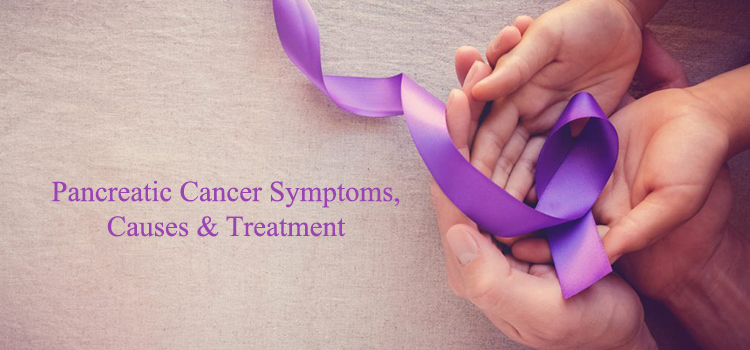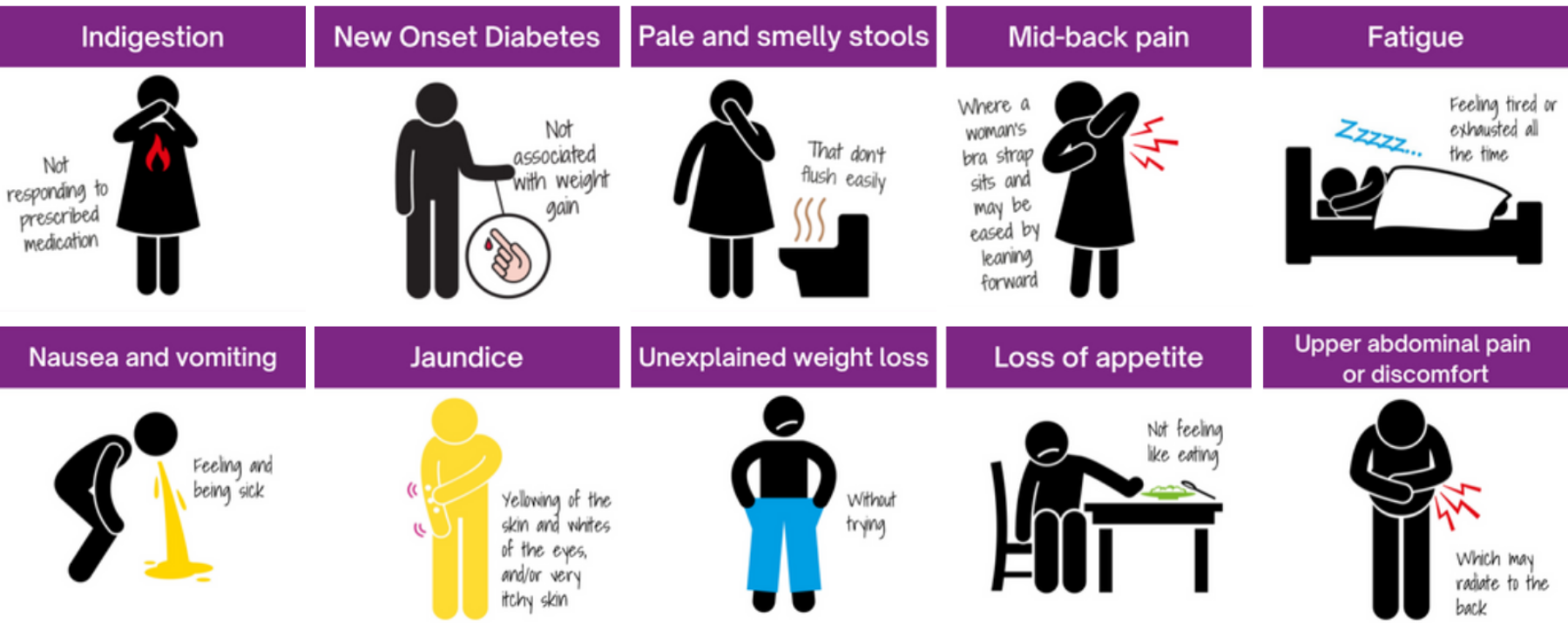Pancreatic Cancer Symptoms

Signs of Pancreatic Cancer
Pancreatic Cancer
The pancreas helps in secreting enzymes which aid digestion and also produce hormones that help in regulating sugar metabolism in the body. Pancreatic cancer is usually detected very late and spreads rapidly in the body as it still has a relatively poor prognosis. It is usually detected in its later stages when it becomes difficult to treat.
Pancreatic cancer develops in the lowers parts of the pancreas (stomach). It is a painful condition, which causes unexplained appetite and weight loss in the patient.
Get in touch for free traetment plan >>
Pancreatic Cancer Causes
The risk of developing pancreatic cancer might increase because of the following conditions:
⇒ Long-term inflammation in the Pancreas
⇒ Stomach Ulcer
⇒ Helicobacter Pylori Infection
⇒ Diabetes
⇒ Gum or Tooth diseases
⇒ Hereditary Pancreatitis
⇒ Family Cancer Syndrome
⇒ Diet
⇒ Smoking or Alcohol Consumption
⇒ Previous experience with Cancer and its treatment (Radiotherapy or Chemotherapy)
Pancreatic Cancer Symptoms
A patient might experience no symptoms in the earlier stages of Pancreatic Cancer. However, as cancer progresses, its symptoms also become aggressive. But the majority of these symptoms are non-specific like weight loss and lack of appetite, which can be caused because of other medical conditions as well.

Here are some of the common symptoms experienced in Pancreatic Cancer:
⇒ Jaundice - Pancreatic cancer blocks the duct which releases bile in the intestine, which affects the digestion of the patient. This turns the color of the skin and the eyes into yellow, causing jaundice. The same blockage can also result in causing dark urine, itching, and light-colored stools.
⇒ Abdominal pain - Pancreatic cancer is also known for causing unexplained severe to dull pain in the upper abdomen and the back of the patient. This pain usually keeps coming and going unexplainably.
⇒ Gallbladder/Liver Enlargement – Pancreas cancer might cause blockage in the bile duct, that build ups in the gallbladder, causing the gallbladder to grow in size. In some cases, the doctors are able to feel this enlargement during physical examination near the ribcage.
⇒ Back pain – Persistent back pain during working hours and this is more likely to occure during bedtime. if you find any symptoms like this then you need to consult your doctor immediately.
⇒ Bloating - Pancreatic cancer patients experience an early sense of fullness while eating that prevents them from eating. They might also experience uncomfortable swelling in their abdomen and stomach.
⇒ Gender – Men are more likely to develop pancreatic cancer than women, this is because of high Tabaco use in men, but slowly this gap is bridging as more females have started smoking.
Get in touch for free traetment plan >>
Other common symptoms could be :
⇒ Nausea
⇒ Vomiting
⇒ Loss of Appetite
⇒ Unexplained Weight loss
Pancreatic Cancer Symptoms experienced during severe stages:
Neuroendocrine tumours or Islet cell tumours are produced from pancreas cells that make hormones. Islet tumour accounts for only 5% of pancreas cancer patients. Abnormal hormones released by the neuroendocrine tumour can cause the following symptoms:
⇒ Insulinomas (excess insulin): anxiety, sweating, fainting, and light-headedness caused because of low blood sugar
⇒ Glucagonomas (excess glucagon): weight loss, excessive thirst and urination, diarrhoea
⇒ Gastrinomas (excess gastrin): stomach ulcers which might cause bleeding, weight loss, reflux abdominal pain
⇒ Somatostatin MAs (excess somatostatin): abdominal pain, weight loss, diarrhoea, foul-smelling bigger stools
⇒ Excess VIPomas (vasoactive intestinal peptide): abdominal cramping, watery diarrhoea, facial flushing
Pancreatic cancer Treatment
.jpg)
Like most cancer, pancreatic cancer can also be treated using radiotherapy and chemotherapy. For the initial stages, the tumour can also be removed surgically from the pancreas.
Chemotherapy
A dose of anti-cancer medicines which are given to the patient orally or using an IV that kill the abnormal cells while also preventing further growth of these cancer cells.
Radiotherapy
Pancreatic cancer uses targeted therapy involving powerful radiation which is directed at the affected area of the patient body that helps in killing the abnormal cells.
Surgery for Pancreatic cancer
Surgery for removing pancreatic tumours
A complicated surgery used for removing cancer or tumour from the pancreas involving removal of the stomach, pancreas, or gut.
Pancreatectomy
A surgical procedure that is used for the removal of a section or the whole gland which produces insulin in the pancreas.
Get in touch for free traetment plan >>
FAQs
Can Pancreatic Cancer be treated?
Pancreatic Cancer can be treated using surgical and non-surgical methods like chemotherapy and radiotherapy.
What is the of chemotherapy in India?
The average cost of chemotherapy in India starts from USD 6000 for a period of 3 months that is subject to increase depending on the stage of cancer that the patient is at.
What causes pancreatic cancer?
Pancreatic cancer develops in the body when an individual's cells mutate and form malignant growth which grows uncontrollably in the body. Over time non-cancerous tumours can also turn into cancer so, they should be checked regularly.
How long does a patient lives after getting diagnosed with pancreatic cancer?
Pancreatic cancer patients whose, cancer is diagnosed in earlier stages have a higher chance of survival than people who get diagnosed at later stages. The survival duration for pancreatic cancer patients after chemotherapy has been reported to be between 6 - 12 months.
How painful is pancreatic cancer?
Dealing with pain is a major concern for most cancer patients. Often the pain experienced during pancreatic cancer progresses with the advancement in its stages. Pancreatic cancer can cause severe abdominal pain, which might come and go without any pattern. Pain relievers might be useful in relieving this pain.
Explore Medmonks.com to learn more about Pancreatic Cancer and find its the affordable treatment options in India.
Comments

By vaibhav | 10.25.2018
Very nice information!






